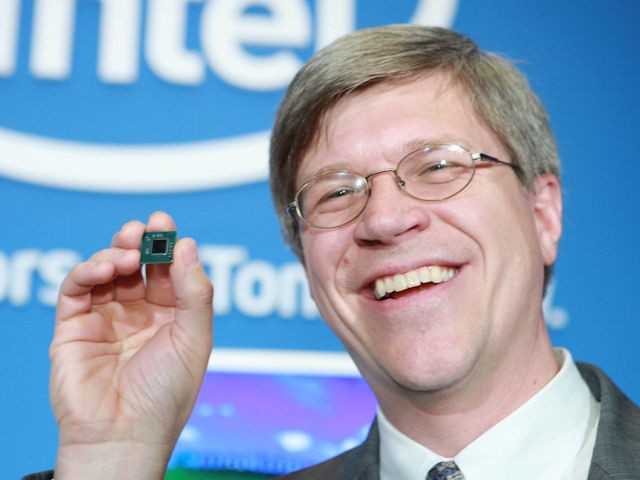Intel May be Working on an Internet TV Service
Intel is reportedly talking to networks about becoming a "virtual operator" for streaming TV content on devices with Intel chips.
The New York Times reports that Intel has held conferences with networks about launching a service for streaming TV shows across the Internet. The chip giant is looking to offer a bundle of channels similar to what's offered by cable and satellite TV providers. The service would stream video to devices with Intel processors, indicating that consumers may have access to their favorite programming not only on desktops, but via Atom-based tablets and smartphones.
According to an unnamed insider close to the negotiations, the Intel executive leading the talks is former BBC executive Erik Huggers. Little else is known about the proposed TV service although there's speculation that Intel may face the same challenges Apple is currently enduring with its own talks. As an example of Apple's troubles, CBS chief executive Leslie Moonves admitted over the weekend that he was approached by the late Steve Jobs but declined to participate.
"I told Steve, 'You know more than me about 99 percent of things but I know more about the television business,'" Moonves reportedly said.
As Apple, Netflix and other companies are discovering, networks are still skittish when it comes to disrupting the current process of piping content to cable and satellite TV providers. Netflix at one time was considered a threat, but after the whole plan change controversy and Starz pulling out, the streaming service now appears more like a standalone own cable channel. Cable companies are also now offering their own streaming services, and Hulu seemingly thrives only because it's owned by NBCUniversal, Fox Entertainment and Disney-ABC Television.
That said, networks are rather happy with the system they've created, locking consumers to their set-top boxes or direct cable hookups. Because of this, they've purposely held back content so that these consumers don't switch over to a cable or satellite TV alternative, thus disrupting the cash flow from the likes of Comcast, Time Warner and DirectTV. A perfect example is Verizon's streaming video service: most of the content can't be streamed over Wi-Fi, but across the company's wireless network instead. This forces subscribers to limit their OTA intake wherever they are and remain faithful to cable or satellite TV.
Intel just recently withdrew from the Google TV initiative, as the initial products -- many of which featured Intel chips -- flopped with consumers thanks to a lack of "compelling content" and "clunky devices." The company also pulled back its efforts to supply chips for the television market in general, indicating that its focus will be on devices like tablets that will be used to watch Internet video. Adding fuel to the "virtual operator" reports, Intel just acquired media codecs from Real Networks.
Will Intel have better luck than Apple? It's possible. As reported just weeks ago, networks and other content providers have "largely balked" at Apple's efforts to exert control over all aspects of the proposed video service, including prices. Sources claim that Apple is taking an unusual approach summarized as "we decide the price, we decide what content," essentially wanting "everything for nothing." Intel will likely have better luck if it takes a different, less-controlling approach.
Get Tom's Hardware's best news and in-depth reviews, straight to your inbox.

Kevin Parrish has over a decade of experience as a writer, editor, and product tester. His work focused on computer hardware, networking equipment, smartphones, tablets, gaming consoles, and other internet-connected devices. His work has appeared in Tom's Hardware, Tom's Guide, Maximum PC, Digital Trends, Android Authority, How-To Geek, Lifewire, and others.
-
sporkimus Wake me up when all of these companies decided to pool their heads together and develop one provider that's actually worth while...Reply -
house70 sporkimusWake me up when all of these companies decided to pool their heads together and develop one provider that's actually worth while...Keep sleeping, buddy, you got plenty of time...Reply -
zak_mckraken I don't like this at all. I'm afraid that networks and content providers will team with chips/devices manufacturers and restrict access to their user base. In this case, you'd have to buy an Intel-enabled device in order to watch something you like. I understand that competition forces companies to fight on different fronts, but in the end it always mean less choice for the consumer. These practices are holding back innovation.Reply -
mindless728 So the cable companies are telling us to pirate more of their shows through torrents since they don't want us to access it with a fair price to any device I want. Sweet.Reply -
dimar Cable TV is completely useless these days. If I ever going to watch TV, it's going to be Netflix or similar type of service. I hope those monopolistic companies such as bell and videotron, here in Canada, would go bankrupt soon, so we can get more competition, or more choices.Reply
-
ceh4702 I would like to see services where you can choose the program or the channels you want to watch when you want to watch it. I am not interested in a setup where you have to buy a package of channels you dont like just to get one or two channels you might actually watch. No more stupid packages!Reply
Most of what is on TV, I would not watch. So why pay for it?
